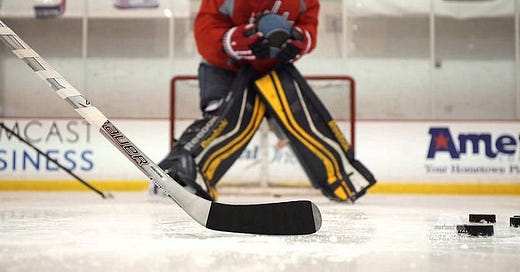Picture a situation where you are on the ice and your goalie dropped his/her stick and can’t retrieve it. As a teammate, what do you do?
Options
1) Hand your stick to the goalie so he/she has one.
The goalie is the most important player on the ice at any given time. He/she should be given priority to play to his/her fullest potential given all the tools in the toolkit
2) Allow the goalie to play without a stick
If you give up your stick, you’re now a prime target for the opposition to target. You’d rather keep your stick and be able to play to your fullest ability. You can allow the goalie to suffer for a bit anyway.
Maximizing Resources
A lost or broken stick is not an ideal situation. The first step in problem-solving through that is how you maximize your resources to best handle the situation.
In any situation where your team is worse off from you doing something, you should avoid that something. Handing your stick to your goalie is one of those somethings.
Players should be able to insulate goalies from high-probability shots. Without having a stick, that becomes a very hard task.
Goalies today should (and are) train to play without a stick. It’s less than an ideal situation, but, as it happens more than occasionally during game-play, it’s worth the preparation. Here is a prime example from the goalie legend Mitch Korn (Started it at 1:10 for you. Don’t need to got past 1:55):
Former NHL goalie Martin Biron seems to agree as well.


We understand many of you likely had coaches who would demand that you give up your stick to the goalie when his/her was lost.
Our advice would be to instruct your team to keep the players’ sticks in the players’ hands.
Further Reading - Learning hockey lessons from Hall-of-Famer Martin St Louis
Did you enjoy this newsletter?
Help us spread the ideas within and share it with the people you care about



